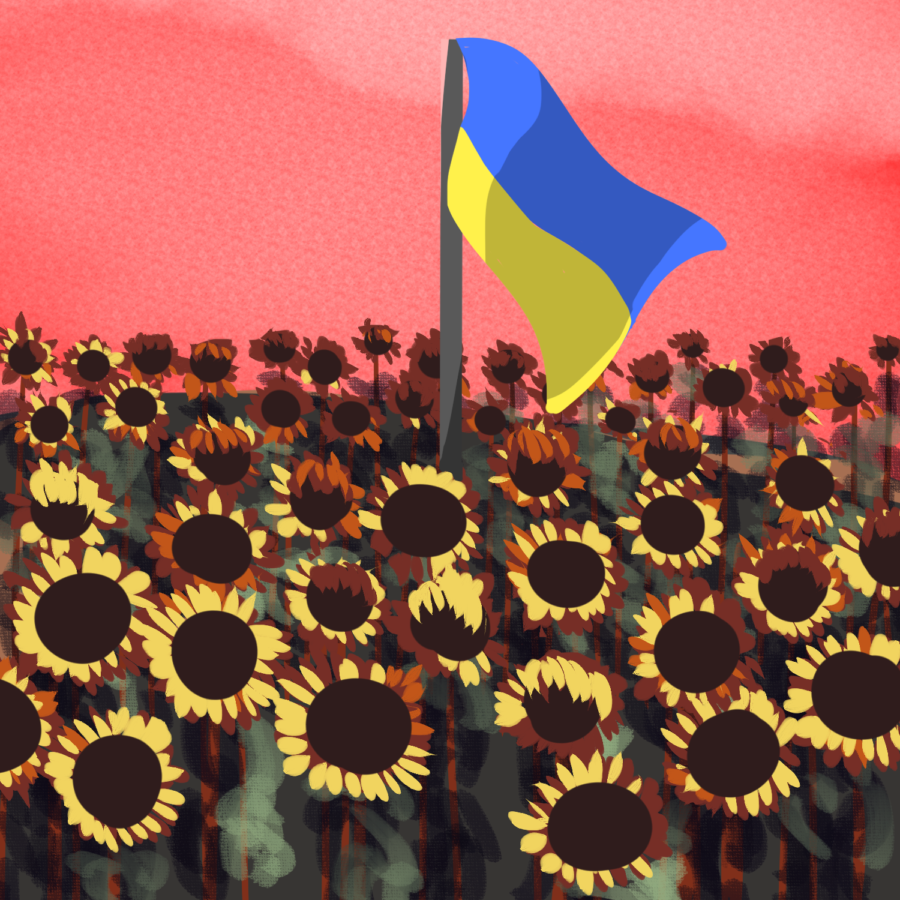Ukraine and Russia continue to clash on the world stage
International conflict surpasses one year of fighting with no clear end in sight
Illustrated by Ashley Jay Burdine
Illustration to commemorate 1 year of the invasion
Russian forces invaded Ukraine under the command of Russian president Vladimir Putin on Feb. 24, 2022, initiating an international conflict that has lasted for just upwards of a year. Despite initial uncertainty about Ukraine’s militaristic strength, the nation has been able to withstand Russia’s barrages, leading to the current state of push-and-pull seen in the war today.
After a year of bloodshed, the death count on both sides continues to rise. According to the New York Times, Russian casualties are approaching “200,000 killed or wounded,” while Ukraine has estimated there to be “100,000 killed or wounded in action, along with at least 30,000 civilian deaths.” According to the United Nations (UN), a reported 13 million Ukrainians have fled their homes since the start of the war.
Russia’s invasion of Ukraine in 2022 was the boiling point of long-standing tension between the two nations. In 2014, Russia illegally annexed the Ukrainian-occupied area of Crimea. Ukraine was left vulnerable after Russian forces swiftly seized the region, causing think tanks such as Brookings to describe Ukraine as “[lacking] the leverage to restore sovereignty over Crimea.”
However, when the war first broke out on Feb. 24 of last year, Russia faced more Ukrainian resistance than expected. Despite the attacks on Ukraine’s capital, Kyiv, and other Ukrainian cities, Russia eventually had to pull back due to the emphatic resistance from the Ukrainian people. Since then, Russia has made numerous offensive attacks against their Western neighbors, but with less success than they had initially planned.
Part of Ukraine’s success stems from its ties to the North Atlantic Treaty Organization (NATO). Despite not being a member of the organization, Ukraine has been a partner country of NATO prior to the invasion in 2022. As a result of the membership, the collective defense that NATO is known for did not go into play following the actions of Russia.
Nevertheless, many NATO member countries have continued to support Ukraine.
Peter O’Brien, professor of political science, detailed how Ukraine has continued to endure Russian assaults.
“There has been very strong military support for Ukraine coming from the NATO block,” O’Brien said. “That has enabled Ukraine to launch a very strong and impressive counter-offensive that has led this war to be a stalemate until now. Russia has gained some territories, particularly in the east, but Ukraine has been able to defend the country quite impressively. It looks now that we are in for a very long war, perhaps a war of attrition, that could go on indefinitely perhaps.”
The United States has directly contributed to the war efforts, providing aid and support in more ways than one. The White House issued an official statement following the anniversary of the conflict that reflected upon the measures taken in order to aid the Ukrainian people. In addition to providing military intel, thousands of armed vehicles and hundreds of thousands of ammunition rounds, the U.S. has also helped Ukraine’s economy by placing sanctions on Russia, alongside over 30 other nations. Furthermore, billions of dollars have been provided for 13 million Ukrainians that have been forced to flee from their homes during the conflict.
In recent months, Ukraine has been relatively successful in defending itself, forcing a Russian retreat in cities such as Kherson, Kharkiv and Lyman. In February, the Eastern Ukrainian city of Bakhmut became even more fierce, with Russian forces gaining ground despite both sides’ immense losses.
Although the vast majority of reports on the topic fixate on the armed exchanges between the two countries, these events have still left millions displaced. With a combination of insecurity and destruction, the idea of returning home is still not viable for Ukrainians who have been forced to flee for their own safety. The UN report referenced prior found that roughly 77% of those who have been displaced wish to return home but are unable to do so given the current circumstances.
The Russian invasion of Ukraine has been less than predictable for all parties involved. Its outcome has and will continue to have a significant bearing on the international community, as future conflicts between some countries and NATO may be contingent on the development of the events currently occurring in Ukraine.
“Now, NATO is more unified and perhaps sees the worth of itself, sees the importance of itself now as a force militarily defending democracy against authoritarian forces,” O’Brien said. Right now, it’s Russia, but maybe elsewhere, it could be China. In that sense, moving forward, it may see itself as an important bulwark against authoritarianism.”

My name is Joshua Mitra and I'm a sophomore planning to double major in political science and communications. I'm from Boise, Idaho and use he/him pronouns....






